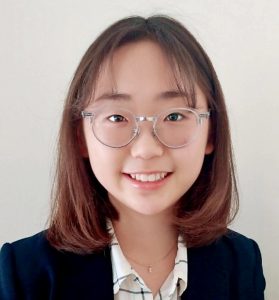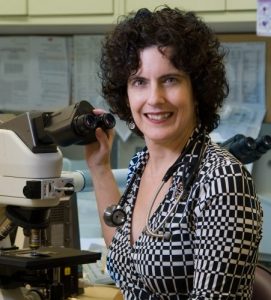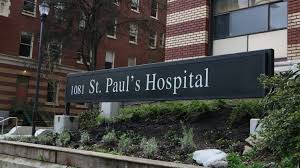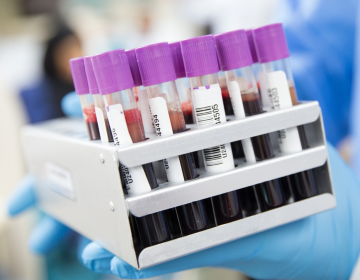 By Cecilia Haymin Kim, CBR-SBME Summer Studentship alum
By Cecilia Haymin Kim, CBR-SBME Summer Studentship alum

Dr. Heather Leitch
Dr. Heather Leitch, MD, PhD, is a Principal Investigator at the Centre for Blood Research (CBR), a hematologist at St. Paul’s Hospital since 2004, a clinical professor at the University of British Columbia, and the Hematology Research Director for Providence Health Care. Dr. Leitch actively conducts research projects and clinical trials that focus on hematologic malignancies. Her recent publications have focused on treatment of iron overload in patients with myelodysplastic syndromes (MDS), HIV-associated lymphoma, monoclonal B-cell lymphocytosis, and relapsed/refractory myeloma.
As a second-year student at Princeton University, majoring in Chemistry with a minor in Global Health Policy and Materials Science, I had the pleasure of working with Dr. Leitch as a summer student in the CBR-SBME Summer Studentship Program. During this time, I was involved with the CBR Knowledge Translation Committee and had the opportunity to interview Dr. Leitch to further discuss her work!
This interview has been edited for length and clarity.
Can you tell us a bit more about your research and professional background?
I completed my PhD in microbiology at UBC where I conducted research in an immunology lab, isolating substances that could affect the growth of leukemia cells. This was an exciting topic that had the potential to be developed as a treatment for chronic myeloid leukemia (CML) at a time when the only effective treatment was a bone marrow transplant, which was not always an option for many people. The kind of translational research that I did for my PhD inspired me to attend medical school. After graduating from medical school at UBC, I completed a hematology fellowship at McGill and post-fellowship training with the Lymphoma Tumour Group at the B.C. Cancer Agency, focusing especially on HIV-related lymphomas.
What inspired you to become a hematologist and a researcher?
My PhD research was what made me passionate about hematology and led to my decision to become a hematologist, although I really enjoyed many of the specialty rotations during my training in internal medicine. As for research, I first planned to participate in bench research, but because of my love for working with patients, I decided to instead pursue clinical research. There wasn’t much protected time for clinical research given my work and responsibilities at the hospital; so much of my research was, and still is, done during the weekends.
What are the challenges of being a clinician-researcher?
I think the biggest challenge is time. It’s difficult to balance being on call, working with patients and their relatives, and doing research all at once. But it’s what I do, and I want to use the training and skills that I’ve gained over the years to bring the most that I can to both aspects of my work!

St, Paul’s Hospital in Vancouver, where Dr. Leitch works as a hematologist
What advice would you give to emerging researchers?
For clinician-researchers, I would say to seek well-protected time for research so that you can pursue your projects, in addition to the clinical work you will be doing. Another thing is that you really do have to love what you’re doing – take every opportunity to learn and get trained so that you are able to get the appropriate background for your future research. For medical residents and students, I would encourage you to seek out research projects that fit within a timed period, where you will be able to learn skills, such as giving oral and poster presentations, that many medical and residency programs won’t address.
How has your experience with the CBR impacted your research?
Working with the CBR has provided opportunities for collaboration between clinicians and scientists, fostering the translational aspect of research – how the work that is being done in labs can directly impact treatment methods for patients. I’ve also worked with medical students as part of the Summer Student Research Program and the CBR Summer Program almost every year since 2006, so it’s been gratifying to supervise students who help me with different projects and are able to learn and obtain research experience. Past projects that I’ve done with my students include collecting patient data from medical records, adding information to clinical databases, and recently, analyzing cardiac events in patients with myelodysplastic syndromes and iron overload.
What excites you most about your work?
I find that clinical work is immediately rewarding – to be able to work with patients and help them towards recovery and improved quality of life is a very meaningful experience. Examining past treatments to find better approaches for future patients and educate the next generation of hematologists is also very exciting!
 Could you tell us what a day in your life looks like and how COVID-19 has affected your day to day responsibilities?
Could you tell us what a day in your life looks like and how COVID-19 has affected your day to day responsibilities?
My day generally consists of meeting with patients and doing rounds on the wards. COVID has really changed what that looks like. Most appointments are now done over the phone, as many hematologists are working remotely from home. When we’re at the hospital, our time dedicated to patient care requires protection of patients and physicians from possible COVID infection, which requires personal protective equipment such as gowns, masks, and eye coverings. It’s been quite an adjustment to move everything online, as the type of interactions I have with patients is different from when we meet in person. By the same token, the interactions I have with my colleagues have changed significantly, as ideas flow more readily when we’re in the same room, rather than on-screen.
When you’re not in the lab, where can we find you?
Pre-COVID I travelled a lot, both for business and pleasure. There have been many opportunities to go to different places and give talks to colleagues about my work, as there is a lot of interest from clinicians and researchers in different countries. I would have to say that my favourite place to travel is Italy, but I’ve also been to the UK, Russia, different parts of Europe, Japan, Korea, China, Brazil, and Argentina! I also enjoy reading historical fiction, which I do when I travel as well!


